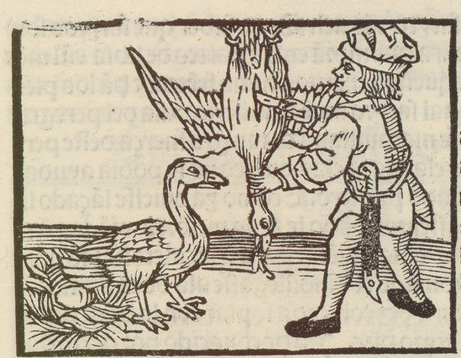Here is the version in Avianus:
Anser erat cuidam pretioso germine feta,
Ovaque quae nidis aurea saepe daret.
Fixerat hanc volucri legem natura superbae,
Ne liceat pariter munera ferre duo.
Sed dominus, cupidum sperans vanescere votum,
Non tulit exosas in sua lucra moras,
Grande ratus pretium volucris de morte referre,
Quae tam continuo munere dives erat.
Postquam nuda minax egit per viscera ferrum,
Et vacuam solitis fetibus esse videt,
Ingemuit tantae deceptus crimine fraudis;
Nam poenam meritis rettulit inde suis.
Sic qui cuncta deos uno male tempore poscunt,
Iustius his etiam vota diurna negant.
Here it is written out in segmented style to make it easier to follow, rearranging the Latin word as necessary to make the syntax more clear:
cuidam
anser erat
pretioso germine feta
et quae
saepe nidis daret
ova aurea.
natura
fixerat hanc legem
volucri superbae,
ne liceat
ferre munera duo pariter.
sed dominus,
sperans
augescere cupidum votum,
non tulit exosas moras
in sua lucra,
ratus
grande pretium
referre de morte volucris,
quae tam dives erat
continuo munere.
postquam
minax egit ferrum
per nuda viscera,
et videt
vacuam esse
solitis fetibus,
ingemuit,
deceptus
crimine tantae fraudis;
nam inde
rettulit poenam
meritis suis.
sic
qui
male poscunt deos cuncta
uno tempore,
iustius
negant his
etiam vota diurna.
Notice that Avianus says simply that somebody, cuidam had this marvelous goose - the owner could be a man or a woman; the pronoun does not declare the gender. As you read through various versions of this story, you will see that sometimes a man is the owner, sometimes a woman, and sometimes a husband and a wife together.
For an illustration, here is an image from Steinhowel's Aesop, where you can see the man slicing into the poor goose with his knife:

For more information about subscribing to this blog via RSS or by email, visit the Bestiaria Latina blog using the link provided here.
No comments:
Post a Comment